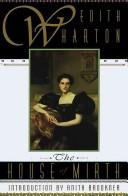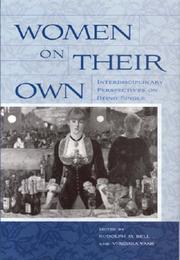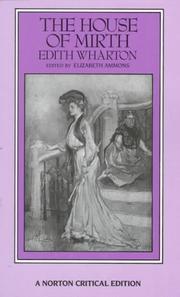| Listing 1 - 10 of 42 | << page >> |
Sort by
|

ISBN: 0140390375 Year: 1985 Publisher: Harmondsworth Penguin books
Abstract | Keywords | Export | Availability | Bookmark
 Loading...
Loading...Choose an application
- Reference Manager
- EndNote
- RefWorks (Direct export to RefWorks)
-Spinsters --- Single women --- Fiction --- New York (N.Y.) --- Fiction.
Book
ISBN: 1574413619 9781574413618 1574412809 9781574412802 9781574412802 Year: 2010 Publisher: Denton, Tex. : University of North Texas Press,
Abstract | Keywords | Export | Availability | Bookmark
 Loading...
Loading...Choose an application
- Reference Manager
- EndNote
- RefWorks (Direct export to RefWorks)
Single women --- Spinsters --- Unmarried women --- Single people --- Women
Book
ISBN: 1443859621 9781443859622 1306859174 9781306859172 1443856894 9781443856898 Year: 2014 Publisher: [Place of publication not identified]
Abstract | Keywords | Export | Availability | Bookmark
 Loading...
Loading...Choose an application
- Reference Manager
- EndNote
- RefWorks (Direct export to RefWorks)
This book presents the stories of 10 single women who are in their old age and have never been married, and explores the psychological conditions of these women. Specifically, it discusses issues pertaining to their self-concepts, mental states, and coping strategies. It also examines the women's recollections of childhood memories, family history, experiences with death, and their thoughts on the meaning of life. Pandora's Box: Looking into the Conditions of Ageing Single Women in Mindanao sheds light on the physiological and psychological changes that the women experienced in their late adul
Single women --- Spinsters --- Unmarried women --- Single people --- Women --- Social conditions.
Book
ISBN: 2708912321 9782708912328 Year: 1977 Publisher: Toulouse Privat
Abstract | Keywords | Export | Availability | Bookmark
 Loading...
Loading...Choose an application
- Reference Manager
- EndNote
- RefWorks (Direct export to RefWorks)
Single women --- Spinsters --- Unmarried women --- Single people --- Women --- Single women - France
Book
ISBN: 019812693X Year: 1988 Publisher: Oxford Clarendon
Abstract | Keywords | Export | Availability | Bookmark
 Loading...
Loading...Choose an application
- Reference Manager
- EndNote
- RefWorks (Direct export to RefWorks)
Governesses --- Single women --- Spinsters --- Unmarried women --- Single people --- Women --- Child care workers --- Teachers --- England.


ISBN: 9780813542102 0813542103 9780813542119 0813542111 9780813544014 0813544017 1281397172 9781281397171 9786611397173 Year: 2007 Publisher: New Brunswick, NJ
Abstract | Keywords | Export | Availability | Bookmark
 Loading...
Loading...Choose an application
- Reference Manager
- EndNote
- RefWorks (Direct export to RefWorks)
Despite what would seem some apparent likenesses, single men and single women are perceived in very different ways. Bachelors are rarely considered "lonely" or aberrant. They are not pitied. Rather, they are seen as having chosen to be "footloose and fancy free" to have sports cars, boats, and enjoy a series of unrestrictive relationships. Single women, however, do not enjoy such an esteemed reputation. Instead they have been viewed as abnormal, neurotic, or simply undesirable-attitudes that result in part from the long-standing belief that single women would not have chosen her life. Even the single career-woman is seldom viewed as enjoying the success she has achieved. No one believes she is truly fulfilled. Modern American culture has raised generations of women who believed that their true and most important role in society was to get married and have children. Anything short of this role was considered abnormal, unfulfilling, and suspect. This female stereotype has been exploited and perpetuated by some key films in the late 40's and early 50's. But more recently we have seen a shift in the cultural view of the spinster. The erosion of the traditional nuclear family, as well as a larger range of acceptable life choices, has caused our perceptions of unmarried women to change. The film industry has reflected this shift with updated stereotypes that depict this cultural trend. The shift in the way we perceive spinsters is the subject of current academic research which shows that a person's perception of particular societal roles influences the amount of stress or depression they experience when in that specific role. Further, although the way our culture perceives spinsters and the way the film industry portrays them may be evolving, we still are still left with a negative stereotype. Themes of choice and power have informed the lives of single women in all times and places. When considered at all in a scholarly context, single women have often been portrayed as victims, unhappily subjected to forces beyond their control. This collection of essays about "women on their own" attempts to correct that bias, by presenting a more complex view of single women in nineteenth- and twentieth-century United States and Europe. Topics covered in this book include the complex and ambiguous roles that society assigns to widows, and the greater social and financial independence that widows have often enjoyed; widow culture after major wars; the plight of homeless, middle-class single women during the Great Depression; and comparative sociological studies of contemporary single women in the United States, Britain, Ireland, and Cuba. Composed of papers presented to the Rutgers Center for Historical Analysis project on single women, this collection incorporates the work of specialists in anthropology, art history, history, and sociology. It is deeply connected with the emerging field of singleness studies (to which the RCHA has contributed an Internet-based bibliography of more than 800 items). All of the essays are new and have not been previously published.
Single women --- Conduct of life. --- Psychology. --- Social conditions. --- Spinsters --- Unmarried women --- Single people --- Women
Book
ISBN: 1438450141 9781438450148 9781438450131 1438450133 Year: 2014 Publisher: Albany, New York : State University of New York Press,
Abstract | Keywords | Export | Availability | Bookmark
 Loading...
Loading...Choose an application
- Reference Manager
- EndNote
- RefWorks (Direct export to RefWorks)
Living on Your Own is an ethnography of young, single women in South Korea who seek to live independently. Using extensive interviews, along with media analysis and archival research, Jesook Song traces the women's difficulties in achieving residential autonomy. Song exposes the clash between the women's burgeoning desire for independent lives and the ongoing incursion of traditional, conservative family ideology and marriage pressure into housing practices and financial institutions. She pays particular attention to the Korean rent system and the reliance on lump-sum cash even for basic subsistence, which promotes tight control of young adults' lives by family and kinship networks. The young women whose voices feature prominently in this book are a prototype of global youth in crisis: caught between aspirations for the self-development and flexible lifestyle championed by globalizing media and communication technology and the reality of their position as flexible labor in a neoliberal economy.
Single women --- Rental housing --- Spinsters --- Unmarried women --- Single people --- Women --- Housing --- Real estate business --- Rent
Book
ISBN: 9781611178715 1611178711 9781611178708 Year: 2018 Publisher: Columbia, South Carolina
Abstract | Keywords | Export | Availability | Bookmark
 Loading...
Loading...Choose an application
- Reference Manager
- EndNote
- RefWorks (Direct export to RefWorks)
"Single, White, Slaveholding Women in the Nineteenth-Century American South investigates the lives of unmarried white women--from the pre- to the post-Civil War South--within a society that placed high value on women's marriage and motherhood. Marie S. Molloy examines female singleness to incorporate nonmarriage, widowhood, separation, and divorce. These single women were not subject to the laws and customs of coverture, in which females were covered by or subject to the governance of fathers, brothers, and husbands, and therefore lived with greater autonomy than married women. Molloy contends that the Civil War proved a catalyst for accelerating personal, social, economic, and legal changes for these women. Being a single woman during this time often meant living a creative and nuanced life, operating within a tight framework of traditional gender conventions while managing subtle changes that worked to their advantage. Singleness was often a route to autonomy and independence that over time expanded and reshaped traditional ideals of Southern womanhood"--
Women slaveholders --- Single women --- Spinsters --- Unmarried women --- Single people --- Women --- Slaveholders --- History --- Southern States
Book
ISBN: 1640123482 1640122699 9781640123489 9781640123465 1640123466 9781640122697 9781640123472 Year: 2020 Publisher: Lincoln, NE
Abstract | Keywords | Export | Availability | Bookmark
 Loading...
Loading...Choose an application
- Reference Manager
- EndNote
- RefWorks (Direct export to RefWorks)
"'Before Chappaquiddick' is the story of Mary Jo Kopechne, a twenty-eight-year-old secretary who worked for Robert F. Kennedy and later Ted Kennedy"--
Congressional secretaries --- Single women --- Spinsters --- Unmarried women --- Single people --- Women --- Office practice in government --- Secretaries

ISBN: 0393959015 Year: 1990 Publisher: New York London Norton
Abstract | Keywords | Export | Availability | Bookmark
 Loading...
Loading...Choose an application
- Reference Manager
- EndNote
- RefWorks (Direct export to RefWorks)
Single women --- -Spinsters --- Unmarried women --- Single people --- Women --- Fiction --- Wharton, Edith --- New York (N.Y.) --- -Fiction --- Fiction. --- Jones, Newbold
| Listing 1 - 10 of 42 | << page >> |
Sort by
|

 Search
Search Feedback
Feedback About UniCat
About UniCat  Help
Help News
News